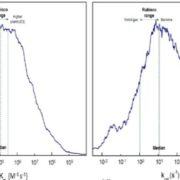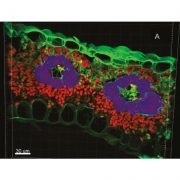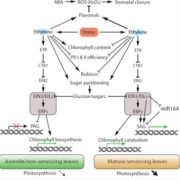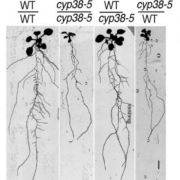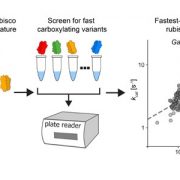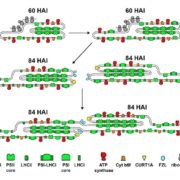Microalgae concentrate CO2 to ameliorate oxidative stress
Choi et al. report that the Chlamydomonas bZIP transcription factor BLZ8 induces the carbon-concentrating mechanism to provide an electron sink pathway, reducing reactive oxygen species production under oxidative stress conditions. Plant Cell. https://doi.org/10.1093/plcell/koab293
By Bae Young Choi, Hanul Kim, Hideya Fukuzawa and Youngsook Lee
Background: Photosynthesis involves a massive flux of high-energy electrons, which can be disrupted by environmental stresses, resulting in oxidative stress. Previous studies established that land plants developed diverse mechanisms that withstand oxidative stress, but it is unclear how microalgae withstand these stresses.
Question: Which transcription factors regulate oxidative stress responses in Chlamydomonas? Do water-dwelling microalgae have distinct stress tolerance mechanisms?
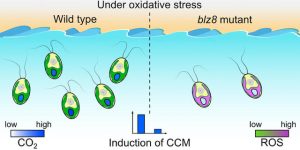 Findings: We found that a bZIP transcription factor, BLZ8, is important for oxidative stress tolerance in Chlamydomonas. Surprisingly, BLZ8 directly regulated the expression of genes likely involved in the carbon-concentrating mechanism (CCM), which was previously known to be important for photosynthesis, by enriching CO2 concentration in chloroplasts. CCM is especially important in organisms dwelling in water where gas diffusion is ten thousand times slower than in air, and thus CO2 supply can limit photosynthetic carbon fixation. BLZ8 mediated induction of CCM increased the photosynthetic affinity for inorganic carbon, which correlates with the increase of the photosynthetic linear electron transfer rate, resulting in suppression of reactive oxygen species production under oxidative stress conditions. Thus, this work revealed that reinforcement of photosynthetic efficiency by inducing CCM protects the growth of microalgal cells under stress conditions, and identified some molecular factors contributing to this process.
Findings: We found that a bZIP transcription factor, BLZ8, is important for oxidative stress tolerance in Chlamydomonas. Surprisingly, BLZ8 directly regulated the expression of genes likely involved in the carbon-concentrating mechanism (CCM), which was previously known to be important for photosynthesis, by enriching CO2 concentration in chloroplasts. CCM is especially important in organisms dwelling in water where gas diffusion is ten thousand times slower than in air, and thus CO2 supply can limit photosynthetic carbon fixation. BLZ8 mediated induction of CCM increased the photosynthetic affinity for inorganic carbon, which correlates with the increase of the photosynthetic linear electron transfer rate, resulting in suppression of reactive oxygen species production under oxidative stress conditions. Thus, this work revealed that reinforcement of photosynthetic efficiency by inducing CCM protects the growth of microalgal cells under stress conditions, and identified some molecular factors contributing to this process.
Next steps: CCM was previously known to increase photosynthetic efficiency under CO2 limitation, but its role in oxidative tolerance is novel. Therefore, it would be interesting to investigate whether the other CCM regulators are also involved in stress responses, especially in water-dwelling organisms, which have to cope with limitations in CO2 supply. Our results could also be useful in bioengineering, since we provide genetic tools to improve oxidative stress tolerance of microalgae by increasing photosynthetic efficiency without compromising biomass production.
Reference:
Bae Young Choi, Hanul Kim, Donghwan Shim, Sunghoon Jang, Yasuyo Yamaoka, Seungjun Shin, Takashi Yamano, Masataka Kajikawa, EonSeon Jin, Hideya Fukuzawa, Youngsook Lee (2021) The Chlamydomonas bZIP transcription factor BLZ8 confers oxidative stress tolerance by inducing the carbon-concentrating mechanism. Plant Cell. https://doi.org/10.1093/plcell/koab293


